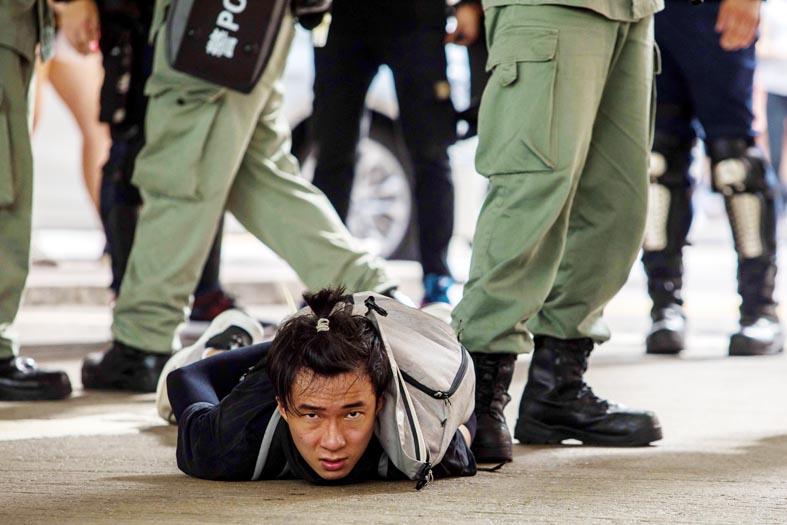The number of Hong Kongers applying for residency in Taiwan skyrocketed 71.7 percent in the first 10 months of the year compared with a year earlier, National Immigration Agency data showed yesterday, as an expert predicted more waves of immigration after the COVID-19 pandemic eases.
In October alone, 1,974 Hong Kongers applied for residency and 128 applied for permanent residency, not only setting a record, but more than doubling the figure from previous months, the agency said.
The number of Hong Kongers applying for residency or permanent residency this year could surpass 10,000, as 8,746 had applied in the first 10 months, already higher than the 7,332 who applied in the whole of last year, it added.

Photo: AFP
Following Hong Kong’s passage of the National Security Law on June 30, the Mainland Affairs Council (MAC) in July opened the Taiwan-Hong Kong Services and Exchanges Office to help Hong Kongers who plan to study, work, invest, start a business or settle in Taiwan.
As of Monday last week, the office had received more than 1,700 inquiries, it said.
Chinese President Xi Jinping (習近平) in his quest for political control has had no qualms about destroying Hong Kong, an expert in cross-strait affairs said.
The territory’s economy contracted 9 percent in the first three quarters of this year, and a lot of foreign investment is preparing to leave, bringing foreign skilled workers and Hong Kongers with economic means along with it, he said.
“Hong Kong cannot go back to how it was before,” as the security law would override everything — even the judges who would dare acquit pro-democracy campaigners, he said.
Under this shroud of fear, more Hong Kongers would want to immigrate to Taiwan, he added.
Although movement is restricted at the moment due to the pandemic, based on the number of inquiries the office has received, he predicted that waves of immigrants would arrive after control measures are eased.
MAC Minister Chen Ming-tong (陳明通) last week told the Legislative Yuan that many Hong Kongers are choosing to settle in New Taipei City’s Tamsui District (淡水).
An official with knowledge of the matter said that cheaper real-estate prices make Tamsui and Linkou District (林口) most attractive to the new arrivals.
Tamsui has become a top choice, as its landscape is reminiscent of Hong Kong island, with real estate at one-eighth of the price, he added.
The shore near the Port of Kaohsiung has also drawn a fair number of transplants, as real-estate and commodity prices are cheaper than in Taipei, the official said.
For an investment visa, applicants only need to invest NT$6 million (US$210,276), less than half of the NT$15 million or more that many other nations require, he said.
However, the most important consideration is Taiwan’s free and open society, he added.

‘ABUSE OF POWER’: Lee Chun-yi allegedly used a Control Yuan vehicle to transport his dog to a pet grooming salon and take his wife to restaurants, media reports said Control Yuan Secretary-General Lee Chun-yi (李俊俋) resigned on Sunday night, admitting that he had misused a government vehicle, as reported by the media. Control Yuan Vice President Lee Hung-chun (李鴻鈞) yesterday apologized to the public over the issue. The watchdog body would follow up on similar accusations made by the Chinese Nationalist Party (KMT) and would investigate the alleged misuse of government vehicles by three other Control Yuan members: Su Li-chiung (蘇麗瓊), Lin Yu-jung (林郁容) and Wang Jung-chang (王榮璋), Lee Hung-chun said. Lee Chun-yi in a statement apologized for using a Control Yuan vehicle to transport his dog to a

Taiwan yesterday denied Chinese allegations that its military was behind a cyberattack on a technology company in Guangzhou, after city authorities issued warrants for 20 suspects. The Guangzhou Municipal Public Security Bureau earlier yesterday issued warrants for 20 people it identified as members of the Information, Communications and Electronic Force Command (ICEFCOM). The bureau alleged they were behind a May 20 cyberattack targeting the backend system of a self-service facility at the company. “ICEFCOM, under Taiwan’s ruling Democratic Progressive Party, directed the illegal attack,” the warrant says. The bureau placed a bounty of 10,000 yuan (US$1,392) on each of the 20 people named in

INDO-PACIFIC REGION: Royal Navy ships exercise the right of freedom of navigation, including in the Taiwan Strait and South China Sea, the UK’s Tony Radakin told a summit Freedom of navigation in the Indo-Pacific region is as important as it is in the English Channel, British Chief of the Defence Staff Admiral Tony Radakin said at a summit in Singapore on Saturday. The remark came as the British Royal Navy’s flagship aircraft carrier, the HMS Prince of Wales, is on an eight-month deployment to the Indo-Pacific region as head of an international carrier strike group. “Upholding the UN Convention on the Law of the Sea, and with it, the principles of the freedom of navigation, in this part of the world matters to us just as it matters in the

The High Court yesterday found a New Taipei City woman guilty of charges related to helping Beijing secure surrender agreements from military service members. Lee Huei-hsin (李慧馨) was sentenced to six years and eight months in prison for breaching the National Security Act (國家安全法), making illegal compacts with government employees and bribery, the court said. The verdict is final. Lee, the manager of a temple in the city’s Lujhou District (蘆洲), was accused of arranging for eight service members to make surrender pledges to the Chinese People’s Liberation Army in exchange for money, the court said. The pledges, which required them to provide identification